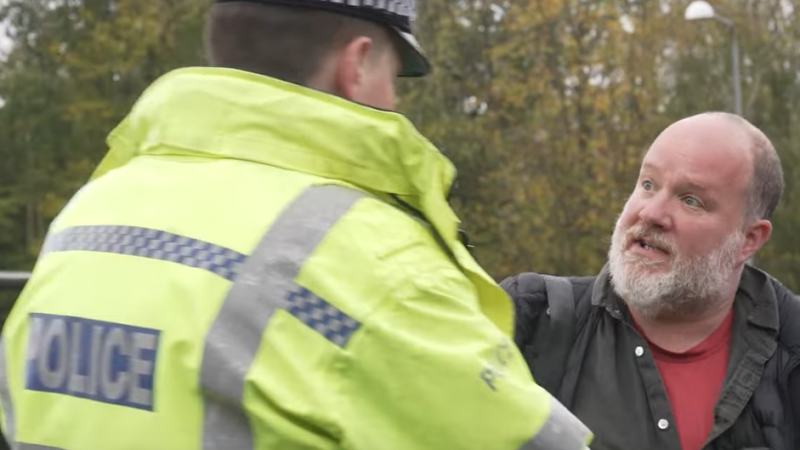Justice, a law reform and human rights charity, has raised concerns that if the impending Public Order Bill is passed into law, the detention of journalists may become ‘commonplace.’

The warnings have been made as three journalists were arrested this week while covering the Just Stop Oil protests on the M25.
Documentarian Rich Felgate, documentary photographer Tom Bowles, and Charlotte Lynch, a reporter for LBC, were arrested and detained for filming the actions of the environment activists on the motorway. Felgate and Bowles were arrested and held for 13 hours, despite showing their press cards to police officers. Lynch, who also had a press card, was arrested, and held for five hours.
The arrests prompted widespread outrage. The National Union of Journalists (NUJ) shared its concerns, saying they had “raised this directly with the National Police Chiefs Council and Herts Police.”
NUJ general secretary Michelle Stanistreet said: “We now call upon the National Police Chiefs’ Council to take immediate action to ensure this is prevented in future by all police forces who are overseeing the issues of public order associated with the Just Stop Oil protests being conducted on the M25 and elsewhere.
“A central, key aspect of this has to be initial identification of the status of such news gatherers on the basis of their holding of the UK Press Card Authority Press Card, as recognised by the National Police Chiefs’ Council itself.”
Public Order Bill
Meanwhile, the law reform organisation Justice has voiced concern about the frequency of similar arrests if the Public Order Bill becomes law.
The Public Order Bill is designed to give police greater powers to crack down on “guerrilla” protest activities. The measures include the power to jail activists for ‘locking on’ and banning repeat offenders from attending protests. It names the protests of Just Stop Oil, Extinction Rebellion, and Insulate Britain, as reasons why it is required. The bill, which is on its way to becoming law, has been criticised for “treating peaceful protest like terrorism.”
Commenting on this week’s arrests in relation to the Public Order Bill, Tyrone Steele, a criminal lawyer at Justice, said: “These incidents clearly demonstrate the broad range of powers that already exist to police protests and show how they can be misused to stifle press freedom…
“These arrests foreshadow what might become commonplace if the Public Order Bill is passed. The Bill creates a swathe of new criminal offences that are so broad they have the potential to capture a vast range of ordinary peaceful behaviour, including journalists covering protests.”
Critics also fear the Bill may allow for the detention of those suspected of intending to participate in an obstructive protest.
Steele makes such warnings, saying the powers are made worse through the proposed introduction of Protest Banning Orders, which, according to the criminal lawyer, could be applied to people with “the most tangential connection to a protest, from shopkeepers who sell protesters glue, soup, or cake, to journalists covering protests as a part of their work.”
“These orders could result in journalists being banned from attending protests, restrictions on their internet usage, GPS ankle taking and, if breached, imprisonment.
“These arrests demonstrate the risks that new police powers could be used disproportionately, serving as a chilling effect on our fundamental rights to freedom of speech, expression, and assembly,” Steele added.
Liberty, which challenges injustice, defends freedom and campaigns to ensure everyone in Britain is treated fairly, has also raised concerns about the Bill. Jun Pang, policy and campaigns officer at Liberty said: “The government is trying to resurrect dangerous anti-protest proposals that the people and Parliament have already loudly rejected just months ago.
“In recent years we’ve seen this government hand out sweeping powers to police which have been used to create a hostile environment for protesters and an increasingly dangerous working environment for journalists who face intimidation and arrest for simply doing their jobs. But this is not an isolated incident.
“The Public Order Bill will have a chilling effect on the right to protest, criminalising anyone attempting to make themselves heard. The arrests we’ve seen this week show that we are heading in the wrong direction. In a functioning democracy, everyone must be able to stand up to power.”
Gabrielle Pickard-Whitehead is a contributing editor to Left Foot Forward
Image credit: Filmmaker and photographer arrested while covering Just Stop Oil protest – YouTube screen grab
To reach hundreds of thousands of new readers we need to grow our donor base substantially.
That's why in 2024, we are seeking to generate 150 additional regular donors to support Left Foot Forward's work.
We still need another 117 people to donate to hit the target. You can help. Donate today.



